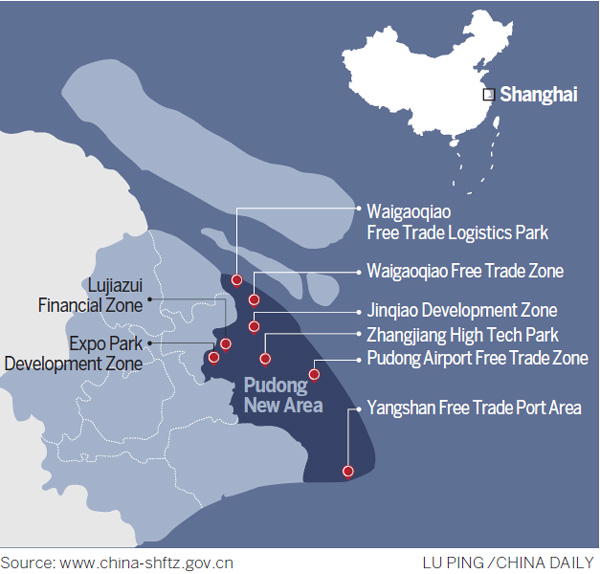
The expanded China (Shanghai) Pilot Free Trade Zone will see a transformation in government functions. These will involve defining the municipal government's administrative responsibilities.
Last week, the expanded Shanghai FTZ was officially launched in Pudong New Area, a financial center of the city. Beijing gave the green light in December last year.
The total area of the Shanghai FTZ will be more than quadrupled from the previously 28.78 sq km to 120.72 sq km. Included in the new boundaries will be the advanced manufacturing-based Jinqiao Export Processing Zone, the high-tech hub Zhangjiang High-Tech Park and the financial center in Lujiazui. All are located in Shanghai Pudong New Area.
But this expansion program has produced administrative challenges. Here, Sun Jiwei, head of Pudong New Area, Xiao Lin, director of the Development Research Center of Shanghai Municipal People's Government, and Chen Yin, deputy secretary-general of Shanghai municipal government, discuss how it will work.
What are the administrative challenges in expanding the China (Shanghai) Pilot Free Trade Zone?
Sun: The transformation of government functions must be given top priority. We should transform the local government based on the criteria and experiences of establishing the Shanghai FTZ. The change should come from local government first by starting a new round of reform, featuring innovation.
What progress has been made to accelerate the transformation of government functions?
Sun: The district government of Pudong, which will administrate the expanded FTZ, announced "two lists" on its official website on April 28. A total of 6,460 administrative rights have been clearly defined. As for administrative responsibilities, they are divided into five major categories. These are: main responsibilities, a supervision system, public services, administrative coordination responsibility and supervision over key areas of major industries.
How many administration departments have been involved?
Sun: A total of 24 district-level departments and four development zone administrative committees, under Pudong, have been involved in the two lists. Three district-level departments have suggested more than 1,000 administrative rights, with 1,772 clauses mapped out by the Environmental Protection Bureau of Pudong, 1,519 from Pudong Market Supervision Administration and 1,027 from Pudong Public Security Bureau.
What role will the two lists play in terms of Shanghai FTZ's expansion?
Xiao: The two lists will help improve the reliability, consistency and predictability of government policies. They will also help to clarify the relationship between the government and the market. This will give the decisive power to the market in terms of allocation of resources.
What is Beijing's attitude toward the progress being made by the Shanghai FTZ?
Chen: As the country's first FTZ, the central government has pinned high hope on Shanghai FTZ's development. During the two sessions held earlier this year, President Xi Jinping announced new requirements for the Shanghai FTZ. He said it should become "the pioneer of pioneers" and to explore the roads of building China with an open economic system. Premier Li Keqiang said during his visit to the Shanghai FTZ last year that it should serve as the forerunner of reform, setting new standards in opening up the zone.
